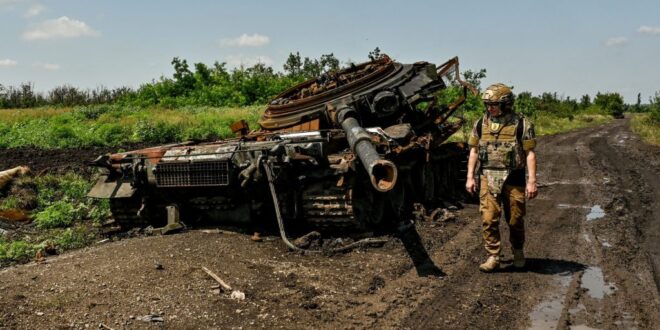In recent weeks, an unsettling narrative has begun to take shape in some segments of the international information space. With Ukraine’s much hyped counteroffensive making minimal progress, a range of commentators have started suggesting the time has come to push Ukraine to the negotiating table rather than prolong the current stalemate.
Such arguments are dangerously misleading. In reality, the slow pace of Ukraine’s counteroffensive progress should not come as a surprise. After all, Ukraine lacks modern aviation and long-range strike capabilities, while Russia has had many months to prepare formidable defenses across occupied Ukrainian territory, including complex fortifications and vast minefields.
The real question is whether the West is doing enough to support Ukraine’s military efforts. The blunt answer is no. Military aid provided since February 2022 has undeniably been crucial, but it is a far cry from what is needed for Ukraine to execute a successful operation against a well-armed and deeply entrenched enemy. No Western general would dream of attempting a similar offensive armed only with the weapons currently available to the Ukrainian military.
Delays in the delivery of military aid have already cost countless Ukrainian lives. If Ukraine had received modern battle tanks, long-range missiles, fighter jets, and Patriot missile defense systems during the early months of the fighting, the dynamics of the war would have been markedly different. If a significant portion of these weapons had been sent to Ukraine in 2021, the whole invasion could potentially have been averted. Instead, hundreds of thousands have been killed and entire cities have been reduced to rubble. In the face of this carnage, continued hesitation is inexcusable.
Calls to pressure Ukraine into some kind of negotiated settlement are equally unhelpful and reflect a fundamental misreading of Russia’s invasion. Time and again, Putin has made clear his intention to destroy Ukrainian statehood and erase Ukrainian national identity. As US Secretary of State Antony Blinken rightly observed in February 2023, Russia fights for conquest while Ukraine fights for freedom. If Russia stops fighting the war will end, but if Ukraine stops fighting it will cease to exist, he warned.
After eighteen months of resistance involving terrible losses and incredible sacrifice, it should be obvious to all serious observers that Ukraine will not negotiate over its continued existence. On the contrary, the Ukrainian authorities have repeatedly clarified their commitment to the complete liberation of the country. They are redoubling efforts to expand domestic military production capabilities and will fight on for many more years if necessary.
No reduction in Western military aid could coerce Ukraine into trading land for peace or condemning millions of Ukrainians to the horrors of permanent Russian occupation. Any attempt to test this flawed theory would merely extend the war further and increase the suffering of the Ukrainian people while emboldening the Kremlin.
Putin is encouraged by any sign of wavering international support for Ukraine. He is currently pinning his hopes on outlasting the West, and remains convinced Ukraine’s democratic allies will eventually lose interest in the war. If he is proved right, the consequences for international security would be disastrous; democracies around the world would find themselves at risk of aggression from authoritarian neighbors.
Frustration over the slow pace of Ukraine’s counteroffensive is understandable, as is pessimism regarding the prospects of a decisive breakthrough. At the same time, talk of a stalemate is shortsighted. Over the past eighteen months, the Ukrainian military has repeatedly demonstrated its ability to adapt and innovate. If provided with sufficient support, there is every reason to believe Ukraine could achieve its goal of de-occupying the country.
Meanwhile, Russia looks to be increasingly vulnerable. Putin may appear unyielding, but the cracks in his regime are beginning to show. The aborted Wagner mutiny in late June left Putin looking weaker than at any time in his 23-year reign, while the recent dismissal or apparent detention of numerous senior generals has highlighted divisions within the Russian military.
Ukraine’s Western partners have every reason to expect a return on the considerable military aid they have provided over the past year-and-a-half. But this does not grant anyone the right to pressure Ukraine into surrender. Instead, Ukraine’s lack of progress over the past two months should serve as a wake-up call for Western leaders. Their response will shape the geopolitical landscape for decades to come.
Any attempt to abandon Ukraine or force the country into a compromise peace would be a moral and strategic failure of the highest order that the collective West would struggle to recover from. In order to safeguard international security, Russia must be defeated. This can be achieved by giving Ukraine the tools to finish the job. So far, Ukraine has been armed to secure the country’s survival. It is time to arm Ukraine for victory.
 Eurasia Press & News
Eurasia Press & News




